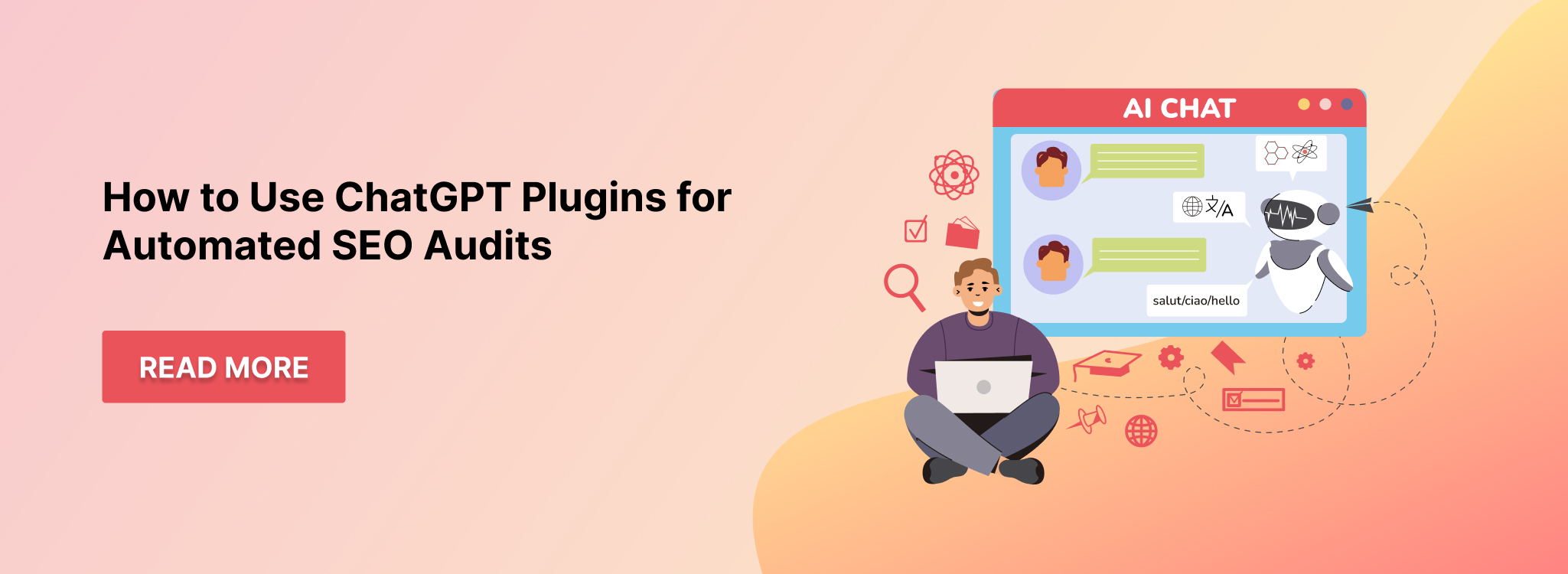How to Use ChatGPT Plugins for Automated SEO Audits
SEO has always been a moving target. From algorithm updates to Core Web Vitals, keeping your site optimized can feel like trying to solve a puzzle with missing pieces. Now AI has stepped into the game and it’s changing everything.
ChatGPT isn’t just a conversational tool anymore. With the right plugins, it becomes a powerful automated SEO auditor that can analyze your website, flag critical issues, and recommend fixes – all in natural language. You don’t need to be an SEO expert or juggle 10 browser tabs full of audit tools. You just need the right plugin, a clear prompt, and a few minutes.
This is the future of technical SEO – intelligent, fast, and conversational.
Whether you’re running an agency, managing an in-house SEO team, or just trying to improve your site rankings, this guide will show you how to:
- Use ChatGPT plugins to run automated SEO audits
- Generate on-page and technical reports with prompts
- Combine AI audit tools into a scalable workflow
- Eliminate bottlenecks with tactical prompt + plugin strategies
Let’s walk through how to turn ChatGPT into your personal SEO assistant and never look back.
2. Understanding ChatGPT Plugins & SEO Audit Tools
AI might feel like magic, but what powers automated audits inside ChatGPT is a combination of specialized plugins and well-structured prompts. Before you run your first audit, let’s clarify what these tools are and why they matter.
2.1 What Are ChatGPT SEO Plugins?
ChatGPT plugins are third-party tools that extend ChatGPT’s capabilities. Think of them as apps inside the chatbot, each built to perform a specific task using live data or third-party APIs.
When it comes to SEO, plugins turn ChatGPT from a content assistant into a full-fledged audit machine. Here’s how it works:
- You enable SEO plugins like SEO Assistant, SEO Core AI, Website Performance Analyzer, or Link Reader.
- You feed a prompt – e.g., “Audit this page for broken links and missing meta tags.”
- ChatGPT accesses the plugin, analyzes the input (usually a URL), and returns an audit-style response with actionable insights.
These plugins are powered by live crawl data, external SEO tools, or APIs that scan your page in real time. That means you’re getting more than a static opinion; you’re getting an audit based on fresh data. It’s like having Screaming Frog or Ahrefs inside a conversation.
2.2 Why Use Plugins for Audits Instead of Manual Checks?
 Manual audits still matter, especially for large websites. But plugins change the game in three key ways:
Manual audits still matter, especially for large websites. But plugins change the game in three key ways:
Speed
- Scan technical and on-page SEO issues in seconds
- No switching tabs or exporting CSVs
- Perfect for spot checks and fast iterations
Scalability
- Audit multiple pages with a single prompt + loop
- Great for freelancers and agencies managing multiple clients
Simplicity
- No need to learn complex software
- Results are conversational and easy to understand, even for non-SEOs
Plugins don’t replace advanced tools entirely, but they make SEO more accessible, especially for startups, content teams, and marketers who want answers fast. If you’re trying to scale your audits without growing your tool stack (or your tech stress), this is where to start.
3. Pre‑Audit Setup: Installing & Enabling Plugins
Before you can automate anything, you need to unlock the tools. Fortunately, setting up SEO plugins in ChatGPT is fast and frictionless, but there are a few things you should know upfront.
3.1 Subscription Requirements & Plugin Store
To use ChatGPT plugins, you’ll need:
- A ChatGPT Plus or ChatGPT Team subscription
- Access to the GPT-4 model
- The plugin feature enabled from your settings
Once that’s done, head to the Plugin Store, it works like an app marketplace. Just search for terms like “SEO”, “website analyzer”, or “audit”, and you’ll see a list of available plugins.
A few high-utility options:
- SEO Assistant – Keyword analysis, metadata audits, and page-level improvements
- Website Performance Analyzer – Site speed checks, mobile responsiveness, Core Web Vitals
- Link Reader – Internal/external link checks and anchor text evaluation
- Scraper Plugin – Page-level data extraction to review H-tags, meta info, and more
- Prompt Perfect (Optional) – Optimizes your audit prompts for better results
Once installed, toggle them on for your session and ChatGPT will automatically call them when a prompt needs external data or a page scan.
3.2 Recommended Plugins for SEO Audits
Here’s a quick overview of plugins worth enabling before you run your first audit:
| Plugin | What It Does | Best Use Case |
| SEO Assistant | Provides SEO scores, checks on-page elements, offers optimization tips | On-page audits, keyword checks |
| Website Performance Analyzer | Analyzes site speed, mobile performance, Core Web Vitals | Technical SEO audits |
| Link Reader | Scans internal/external links and anchor text quality | Link audits, 404 checks |
| Scraper Plugin | Extracts content structure, H1-H6 tags, and meta info from pages | Content audits, structure review |
These plugins act like specialized mini-tools inside your ChatGPT window, no extra logins or dashboards required. Once installed, you’re ready to audit pages, pull diagnostics, and generate SEO reports using just your voice (or keyboard).
4. Step-by-Step Workflow: Prompt + Plugin Audit Process
Now that your plugin setup is ready, let’s break down how to actually use ChatGPT to run an automated SEO audit, not just in theory, but in real, tactical steps – through a full prompt + plugin workflow, from scanning a URL to generating an actionable report.
4.1 Step 1 – Run an On-Page SEO Audit
Start with a quick on-page audit to evaluate the fundamentals: headings, titles, meta descriptions, keyword targeting, and basic structure.
Try this prompt:
“Using SEO Assistant, audit the following URL for keyword usage, H1-H6 tags, meta title/description, and content clarity: [your URL here].”
ChatGPT will return a breakdown of:
- Presence (or absence) of key tags
- Relevance of meta title and description
- Overuse or underuse of target keywords
- Whether the headings follow a clear hierarchy
This is your first checkpoint, before diving deeper, make sure the content basics are solid.
4.2 Step 2 – Check Page Speed, UX & Core Web Vitals
Performance is no longer optional. Page load time, responsiveness, and layout shifts all directly affect SEO and user experience.
Prompt to use:
“Using Website Performance Analyzer, evaluate this URL for page speed, Core Web Vitals, and mobile usability issues.”
In return, you’ll see insights like:
- Largest Contentful Paint (LCP)
- Total Blocking Time (TBT)
- Cumulative Layout Shift (CLS)
- Mobile viewport or font sizing issues
These metrics tell you not just if your page loads, but how well it loads across devices.
4.3 Step 3 – Identify Keyword Gaps & Content Opportunities
Once the structure and performance are clean, it’s time to look for optimization potential.
Use this prompt:
“Based on this page’s content, what related keywords or semantic phrases are missing that could help improve topical relevance?”
ChatGPT (via SEO Assistant) will suggest:
- Semantically related phrases (LSI)
- Subtopics or questions not covered
- Long-tail variations of your main keywords
This makes your content not just readable but recommendable by AI.
4.4 Step 4 – Audit Internal & External Links
Links are critical for SEO, but broken links or bad anchor text can tank UX and authority.
Try this prompt:
“Using Link Reader, scan this page for internal and external links, note any broken links, and evaluate anchor text diversity.”
The plugin will return:
- List of links with status codes
- Broken or redirected links
- Repeated or generic anchor text (“click here”)
- Opportunities for contextual linking
This is also a good time to ensure your links support SEO, not just navigation.
4.5 Step 5 – Evaluate Schema, FAQ & Structured Data
AI tools (including ChatGPT) love structured data. Schema markup helps bots understand your content, not just read it.
Prompt to run:
“Check if this URL has valid schema markup for articles, FAQs, or products. Suggest improvements if missing.”
With the right plugin (like Scraper or Website Analyzer), ChatGPT will flag:
- Missing or incomplete JSON-LD
- Absent FAQ or HowTo schema
- Invalid or deprecated schema types
- Tips to structure your markup better
Structured data isn’t just a technical bonus anymore; it’s core to AI visibility.
4.6 Step 6 – Compile an Actionable SEO Audit Report
Time to pull it all together.
Final prompt:
“Summarize the SEO findings from this audit in a structured report format. Include issues found, suggested fixes, and priority level.”
ChatGPT will generate:
- A prioritized list of SEO issues
- Suggested actions for each
- Optional score or rating for context
- A simple structure to share with devs, writers, or clients
You now have a full automated SEO audit, generated conversationally without switching tools, or even leaving the chat window.
5. Real‑World Prompt Examples & Workflow Templates
 Knowing what to prompt is just as important as the plugins themselves. Generic requests like “do an SEO audit” won’t get you very far. You can use ready-to-use prompt templates tailored for different audit tasks, so you can get accurate, useful results every time.
Knowing what to prompt is just as important as the plugins themselves. Generic requests like “do an SEO audit” won’t get you very far. You can use ready-to-use prompt templates tailored for different audit tasks, so you can get accurate, useful results every time.
Prompt Template: Full On‑Page SEO Audit
“Using the SEO Assistant plugin, audit the following URL for title tag, meta description, header tags (H1–H6), keyword usage, and content readability. Provide improvement suggestions.”
When to use it: Any time you’re optimizing a blog post, product page, or landing page.
Prompt Template: Core Web Vitals & Speed Check
“Use the Website Performance Analyzer plugin to analyze this URL’s Core Web Vitals, page speed, mobile responsiveness, and any UX issues. Suggest quick fixes.”
When to use it: Before launching a new page or after a redesign.
Prompt Template: Keyword Gap & Semantic Optimization
“Based on the page content from this URL, identify any missing semantic keywords or related search phrases that could improve topical relevance.”
When to use it: During content refresh cycles or before scaling content clusters.
Prompt Template: Link Audit (Internal & External)
“Using the Link Reader plugin, scan this page for all internal and external links. Flag any broken links, excessive redirects, or non-descriptive anchor text.”
When to use it: Quarterly audits or whenever fixing UX/SEO issues.
Prompt Template: Structured Data & Schema Evaluation
“Analyze this URL for existing schema markup. Identify missing structured data types like FAQ, Product, or Article, and recommend JSON-LD improvements.”
When to use it: For content-heavy or eCommerce pages where rich results matter.
Prompt Template: Generate a Shareable SEO Audit Report
“Summarize the audit findings for this page into a structured SEO report. Include: issue category, severity, suggested fix, and estimated impact.”
When to use it: When presenting results to clients, developers, or content teams.
These templates aren’t just shortcuts; they’re systems. Once saved, you can reuse and scale them across sites, clients, or even team workflows.
6. Benefits of Plugin‑Powered SEO Audits
Now that you’ve seen how to use plugins and prompts together, it’s worth understanding why this method is gaining traction so quickly. AI‑driven audits inside ChatGPT aren’t just faster; they fundamentally change how SEO work gets done. Here’s how.
6.1 Faster Diagnosis & Real-Time Insights
Most traditional audits involve logging into multiple tools, exporting spreadsheets, and sifting through dashboards.
ChatGPT plugins cut that out.
- Get real-time page scans in one prompt
- Run quick audits during live client calls or team standups
- Identify issues without deep-diving into every SEO tool
Speed matters, especially when you’re troubleshooting under pressure or juggling multiple projects.
6.2 Consistent Audit Format, Every Time
Plugin-powered audits follow a repeatable structure, especially when you use saved prompts or templates.
That means:
- Every report has the same categories
- No variation based on who’s running the audit
- Easy to benchmark improvements over time
If you’re managing SEO across teams or clients, this consistency saves hours of explanation (and revision).
6.3 Accessible for Non‑Technical Users
You don’t need to be an SEO engineer or crawl bot whisperer to run these audits.
ChatGPT translates technical findings into plain language with context, clarity, and action items.
So, whether it’s:
- A content writer optimizing their blog
- A founder checking performance on their landing page
- A marketer fixing internal links
…anyone on the team can contribute without needing another login or tutorial.
6.4 Actionable Reports, Ready to Share
One of the best parts? These audits don’t just point out issues; they come with fix suggestions built in.
You’ll often get:
- A prioritized issue list
- Suggested fixes with brief explanations
- Optional code snippets (for schema, meta tags, etc.)
- Plain-text summaries that you can copy into docs or email threads
It’s like getting a to-do list and a solution kit in one.
7. Limitations & Best Practices
As powerful as ChatGPT plugins are, they’re not perfect. Understanding where they fall short and how to work around those gaps is key to making your audits accurate, secure, and truly useful.
7.1 Recognizing AI & Plugin Constraints
AI-powered audits rely on external plugins and real-time scraping tools. But they still have some limitations:
- No access to gated content – Plugins can’t audit pages behind logins or paywalls.
- No Google Search Console or Analytics data – These are not integrated natively (yet).
- Occasional inaccuracies – Depending on the plugin, some findings may miss nuance or over-flag minor issues.
- Rate limits – Some plugins only process a few requests per session or may timeout on large pages.
That’s why AI audits should complement, not fully replace, your core tool stack. Always validate major findings before acting on them.
7.2 Human Oversight is Still Required
ChatGPT can point to broken links, missing titles, or outdated schema – but it can’t:
- Understand your brand voice
- Judge which keywords matter most to your business
- Align fixes with your larger content strategy
This is where you step in.
- Use the audit to identify issues.
- Use your judgment to prioritize and implement them.
Think of ChatGPT as your SEO intern who is fast, reliable, but not strategic on its own.
7.3 Data Privacy & Plugin Safety
When using plugins, you’re allowing ChatGPT to fetch data from external sources. That means you should:
- Stick to trusted, verified plugins from the Plugin Store
- Avoid sending sensitive or non-public URLs
- Never audit staging sites or drafts with client data unless you’ve reviewed plugin behavior
If security is a concern, always check the plugin’s source, description, and reviews before use. When in doubt, audit public-facing pages only.
Best practice? Pair ChatGPT with your existing SEO tools, not against them. Let AI handle the grunt work and keep the critical decisions in human hands.
8. From SEO Discovery to Tactical Plugin Workflows
Most SEO strategies start with content optimization for keywords, structuring headings, and targeting user intent. But visibility alone isn’t enough. To compete today, you also need to maintain technical health, eliminate errors, and adapt quickly when things break.
That’s where plugin-powered audits come in. They don’t just help you show up; they help you stay optimized.
8.1 Connecting Visibility with Ongoing Optimization
Here’s how to turn AI visibility into long-term SEO strength:
- Use SEO Assistant to regularly review titles, headings, and keyword alignment across your top pages
- Run Website Performance Analyzer to flag slow-loading pages or mobile layout issues
- Scan with Link Reader to catch broken internal/external links before they affect user experience or rankings
Together, these tools help you spot weaknesses early and keep your site clean, fast, and aligned with search expectations – human and AI alike.
8.2 Build Repeatable SEO Workflows with Prompts
 The real benefit of using ChatGPT for audits is that it’s repeatable. Once you’ve written a few strong prompts, you’ll naturally create an audit system you can reuse across:
The real benefit of using ChatGPT for audits is that it’s repeatable. Once you’ve written a few strong prompts, you’ll naturally create an audit system you can reuse across:
- New blog posts
- Product or service pages
- Landing pages and campaign hubs
Here’s a simple workflow you can build with just prompts:
- Quick Audit
“Check this page for technical and on-page SEO issues using available plugins.” - Fix Summary
“List the issues found with brief explanations and suggest high-priority fixes.” - Implementation Plan
“Generate a checklist for devs or writers with fixes in a copy-paste-ready format.”
Over time, this becomes a cycle – your pages go live, get checked, get fixed, and keep improving. That’s how modern SEO should feel: actionable, fast, and always improving.
9. Advanced Tips & Custom GPT Options
Once you’ve run a few plugin-powered audits, the next question becomes: How do I scale this?
Whether you’re managing multiple domains, streamlining agency workflows, or just trying to level up your technical stack, this section covers advanced ways to get more out of ChatGPT audits without adding more manual work.
9.1 Build a Custom GPT for SEO Audits
If you find yourself repeating the same audit prompts, configurations, or plugin combos, it might be time to create a Custom GPT. Think of it as your personal SEO audit assistant, trained with your tone, preferred plugins, and pre-loaded instructions.
With a Custom GPT, you can:
- Predefine audit workflows (e.g., “Run on-page + speed + schema audit”)
- Include only the plugins you trust
- Customize the output format (table, checklist, dev-ready format, etc.)
- Share it with your team so everyone runs audits the same way
You don’t need to code anything. ChatGPT’s Custom GPT builder lets you configure these options with just a few clicks.
9.2 Use Audit Chains for Multi-Step Reviews
Instead of running individual prompts one at a time, create prompt chains that guide ChatGPT through sequential tasks.
Example:
- Input: “Audit this URL for SEO issues.”
- Follow-up: “Summarize issues by severity.”
- Follow-up: “Turn this into a Trello card or Google Doc checklist.”
- Follow-up: “Write suggested meta title and description fixes.”
Each output builds on the last, creating a smooth, multi-step audit without context switching.
9.3 Integrate with External Tools via APIs or Zapier
Want to take it a step further?
You can connect ChatGPT outputs to other tools using:
- Zapier – Turn audit summaries into project tasks or client reports
- Google Sheets API – Log findings automatically into a spreadsheet
- Notion API – Push structured SEO reports into your team wiki
- Slack Webhooks – Trigger alerts when high-priority issues are found
This turns ChatGPT from a conversational assistant into a full automation layer for your audit process. Advanced workflows are where AI stops being a novelty and starts becoming a serious operational advantage.
Wrapping Up
 If you’re still running SEO audits the old way across five tabs, three tools, and two spreadsheets, now’s the time to streamline it. ChatGPT, when paired with the right plugins, becomes more than a chatbot. It becomes your SEO analyst, technical assistant, and report writer – all in one.
If you’re still running SEO audits the old way across five tabs, three tools, and two spreadsheets, now’s the time to streamline it. ChatGPT, when paired with the right plugins, becomes more than a chatbot. It becomes your SEO analyst, technical assistant, and report writer – all in one.
You’ve now seen how to:
- Enable powerful SEO plugins inside ChatGPT
- Use smart, tactical prompts for every audit phase
- Extract real-time insights for on-page, performance, links, and schema
- Turn those findings into structured, shareable reports
- Scale your audits using templates, Custom GPTs, and automation chains
Whether you’re a solo marketer, agency owner, or technical SEO specialist, this system gives you speed without sacrificing depth.
You can:
- Run spot checks on client sites in under 5 minutes
- Monitor performance and keyword usage after every content push
- Deliver audit insights in clear language anyone can act on
The next step? Start with one URL. Use the prompts. Enable the plugins. Run the audit. You’ll see in real-time how much faster and smarter this new method can be.
The audits you used to schedule for end-of-quarter reviews? You’ll now run in between meetings. The reports you used to build over a day? Done in under 10 minutes and still client-ready. This is what SEO looks like when powered by AI.
Frequently Asked Questions
-
What are the best ChatGPT plugins for SEO audits?
Some of the most effective plugins for automated SEO audits inside ChatGPT include:
- SEO Assistant – For on-page SEO checks and keyword optimization
- Website Performance Analyzer – For speed, UX, and Core Web Vitals
- Link Reader – For checking internal/external links and broken URLs
- Scraper Plugin – For extracting page structure and meta information
Each plugin serves a specific purpose, so the best one depends on the type of audit you’re running.
-
Can ChatGPT completely replace traditional SEO tools?
Not entirely and it shouldn’t. ChatGPT plugins are excellent for fast audits, iterative improvements, and building workflows. But they don’t fully replace in-depth tools like Google Search Console, Ahrefs, or Screaming Frog, especially for large sites, crawl maps, or ranking data. Use ChatGPT as a complement to your existing stack, not a full replacement.
-
How do I ensure the audit results are accurate?
Start by using trusted, well-rated plugins from the Plugin Store. Then:
- Cross-check high-impact findings (like broken links or schema issues) with another tool
- Don’t rely on a single plugin’s output, run multiple audits from different angles
- Use structured prompts for consistency
AI can surface great insights, but human review still matters.
-
Are ChatGPT SEO plugins safe to use on client websites?
Yes, as long as you’re only scanning public URLs and using verified plugins. For added safety:
- Avoid inputting confidential data or unpublished content
- Review each plugin’s description before enabling it
- Don’t run audits on staging or internal URLs unless you know what the plugin accesses
Stick to public-facing content, and you’re good to go.
-
How often should I use ChatGPT to audit my site?
It depends on your workflow, but here are some smart use cases:
- Before publishing a new blog or landing page
- After a redesign or site structure update
- Monthly checkups on key pages (home, services, high-traffic blogs)
- Quarterly audits for full site health reviews
Since it’s fast and easy, many marketers now run audits weekly as part of their standard content QA.
-
Can I automate these audits without rewriting prompts each time?
Absolutely. Save your favorite prompt templates, or build a Custom GPT to:
- Pre-load your prompt + plugin stack
- Output results in your preferred format
- Standardize audits across team members or clients
You can even connect to Google Sheets, Notion, or Slack with Zapier for fully automated audit tracking.
Latest posts by Vijaya Tyagi (see all)
AI Mentions Are the New Backlinks – Why They Matter - December 10, 2025
Local AI SEO: Get Picked for “Near Me” - November 26, 2025









